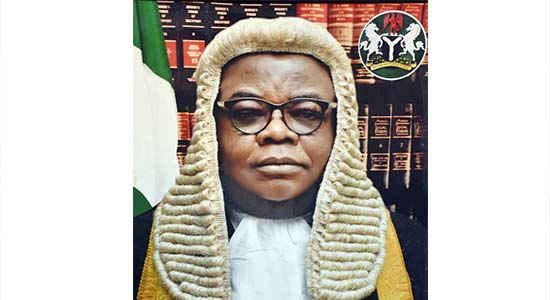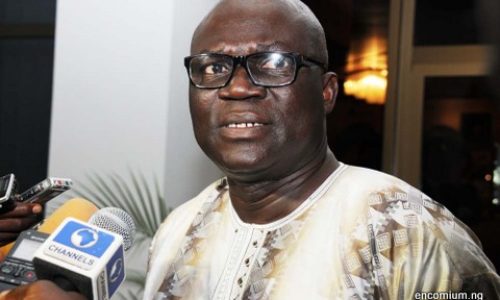A Review of Four Key Judicial Moments in 2021

At the dawn of every New Year, the preoccupation of many is to project what the year holds. This is typical of most human endeavours and concerns, where the New Year is considered as an unknown and unchartered course. Lawyers do not necessarily have this concern. The future of the law is defined and tied to its past. All thanks to the entrenched doctrine of stare decisis. Supposedly, there should be certainty in the law. Once in a while, there is a break from the past or there is no precedent from the past. Such occasions present opportunities to set new precedent to control the foreseeable future. This write up considers four of such moments in the Nigerian jurisprudential landscape in 2021.
Dr Stephen Adi Odey v Chief John Alaga & 2 Others
Service of court processes has always been considered as fundamental. Not just for the sake of it, but for the fair hearing dimension that non-service raises. Hence, the courts have been consistently reluctant in allowing service to be raised as a technical defence.
The judicial mantra has been that the essence of service is notice. See: Akeredolu v Abrahams & Others (2018) 10 NWLR (Pt. 1628) 510, 539; Ajibola v Sogeke (2003) 9 NWLR (Pt. 826) 494, 524; and Mohammed v Babalola (2012) 5 NWLR (Pt. 1293) 395, 434. In a sharp departure from the past, the apex court upheld an otherwise technical objection on service, refusing to impute service on counsel of originating appellate processes to the party. The court held that a Notice of Appeal, being an originating process, must be served personally.
The implications of this decision are far-reaching. Otherwise competent pending appeals may now be rendered defective if the Notice of Appeal was served on counsel. For prospective appeals, parties would have to be served personally to competently initiate the appeal process. It remains to be seen how this decision would apply to interlocutory appeals. This decision of the Supreme Court is reported in (2021) 13 NWLR (Pt 1792) 1
Dr. Joseph Nwobike SAN v Federal Republic of Nigeria
This decision underscores the sacrosanct provisions of section 36 (12) of the Constitution, forbidding vague criminal laws. The Supreme Court towed a consistent line by holding that the provisions of section 97(3) of the Criminal Law of Lagos State cannot ground a charge, as the offence prescribed thereby is not expressly defined. The novel point lies in the crux of the apex court’s judgment, by which it held that the Economic and Financial Crimes Commission (EFCC) lacks the power to investigate and prosecute the offence of perversion of justice. The court reached this conclusion by preferring the ejusdem generis rule in the interpretation of the provisions of section 46 of the EFCC (Establishment) Act. The investigative and prosecutorial powers of the EFCC have been clearly delineated by this decision. The more serious implication of this delineation is that it has been tied inextricably to the competence of a charge being prosecuted by the EFCC. It also appears that the court now attaches a degree of significance to the investigation stage in the criminal justice process. This is a clear departure from the past. See: Fawehinmi v IGP & 2 Others (2000) 7 NWLR (Pt 665) 481, 530; and Esabunor & Another v Faweya & 4 Others (2019) 7 NWLR (Pt. 1671) 316, 339. This decision in SC/CR/161/2020 (delivered on December 20, 2021) is yet to be reported.
The Vessel MT Sam Purpose & Another v Amarjeet Singh Bains & 6 Others
This decision typifies the reverberating effects of section 254C of the Constitution. Prior to the constitutional alteration leading to section 254C, there was no doubt that claims for crew wages fell under the exclusive jurisdiction of the Federal High Court, by virtue of section 251 (1) (g) of the Constitution, section 2 (3) (r) of the Admiralty Jurisdiction Act and section 66 of the Merchant Shipping Act. The introduction of section 254C, vesting exclusive jurisdiction in the National Industrial Court (NIC) in express overriding terms, led to the debate as to whether the Federal High Court could still exercise jurisdiction in claims for crew wages. The need for clarity became more obvious following the inconsistent decisions of the Federal High Court in the earlier cases of Moe O. O. & 27 Others v MV Phuc Hai Sun (unreported) – Suit Number: FHC/L/CS/592/2011 delivered on June 20, 2014 and Assuranceforeningen Skuld (Gjensidig) v MT Clover Pride & Another – (unreported) Suit Number: FHC/L/CS/1807/17 delivered on March 28, 2018. While in the former case, the court upheld the exclusive jurisdiction of the Federal High Court, in the latter, the exclusivity of the NIC’s jurisdiction was upheld.
The Court of Appeal has now settled this jurisdictional debate by holding that the NIC has the exclusive jurisdiction to determine claims for crew wages. The court was emphatic on the prevailing nature of the provisions of section 254C as regards all labour and employment related claims. It is instructive that the decision in MT Sam Purpose is consistent with earlier decisions upholding the exclusivity of the jurisdiction of the NIC. See: John v Igbo Etiti L.G.A (2013) & NWLR (Pt 1352) 1; Sunday Ainabebholo v Edo State University Workers Farmers Multipurpose Cooperative Society & Others (2015) LPELR-24513 (CA); and First Bank of Nigeria PLC v Mr. Nurudeen Ajani Akanji (2017) LPELR-43555 (CA).
Again, this decision of the Court of Appeal has significant consequences. The decision raises a fundamental jurisdictional issue in respect of matters already instituted at the Federal High Court. The law is trite that the issue of jurisdiction can be raised at any time, even for the first time on appeal and without leave. See: Shell Nigeria Exploration Co (Nig) Ltd v FIRS (2021) 17 NWLR (Pt 1806) 545, 575-576; NDIC v CBN (2002) 7 NWLR (Pt 766) 272, 294 – 295, 296; and Wema Securities & Finance v NAIC (2015) 16 NWLR (Pt 1484) 93, 123-124. Being so, the flood gates appear to have been flung open for jurisdictional challenges; more so until the Supreme Court gets the opportunity to finally settle the law on the point. This decision in Appeal Number: CA/LAG/CV/419/2020 (delivered on March 5, 2021) is reported in (2021) LPELP-56460(CA).
Eyitayo Olayinka Jegede & Another v Independent Electoral Commission & 3 Others
This is a peculiar case, given the novelty of the constitutional grounds for challenging the sponsorship of the 3rd and 4th respondents for election to the office of Governor of Ondo State. The 2nd respondent’s letter submitting the names of the 3rd and 4th respondents to the 1st respondent was signed by a sitting Governor as Acting National Chairman. The legal contentions bordered on the constitutionality of the sponsorship, given the provisions of section 183 of the Constitution, which prohibits a sitting Governor from holding any other executive office. If the sponsorship was unconstitutional, the 3rd and 4th respondents would not have been qualified to contest the election and their return would have been vitiated.
In deciding the issue, the apex court drew a distinction between the actual act of nomination and the formality of notifying the electoral umpire. The court also held the view that a finding of unconstitutionality would have serious consequences for the said sitting Governor, who was not joined as a party.
Despite the immunity provisions in section 308 of the Constitution, the apex court held the view that the petition was impaired by the absence of a necessary party, being the said sitting Governor. In dismissing the appeal, the court considered other issues, including holding that the sponsorship of the 3rd and 4th respondents was admitted by the appellant.
This decision is novel in the resolution of the arguably recondite issues presented to the court. However, the decision was reached by a narrow majority of the Supreme Court. A close look at the dissenting judgment will suggest seeds for expanding the frontiers of the law on the issues raised. It remains to be seen whether there will be further implications from this judgment, particularly for some of the parties (or actors) in a (dis)similar factual and jurisprudential context. This decision is reported in (2021) 14 NWLR (Pt 1797) 409.
Conclusion
Every judgment is binding on the parties and constitutes precedent in subsequent cases, provided the facts are similar. See: Eze v Unijos (2021) 2 NWLR (Pt 1760) 208, 223-224; Ekwunife v Ngene (2000) 2 NWLR (Pt 646) 650, 668; Nwangwu v Ukachukwu (2000) 6 NWLR (Pt 662) 674, 689; and Buhari v INEC (2008) 19 NWLR (Pt. 64) 129, 137.
Across the Nigerian judicial hierarchy, hundreds of decisions were pronounced in 2021. They all constitute precedent. However, the cases highlighted here are not only radical in their content but also in their effect. Certainly, they will define the judicial landscape in 2022 and beyond.
Olufemi, a lawyer is a Senior Associate with Esher & Makarios, Lagos.
Note: This article was originally published by The Guardian on 18/01/2022



